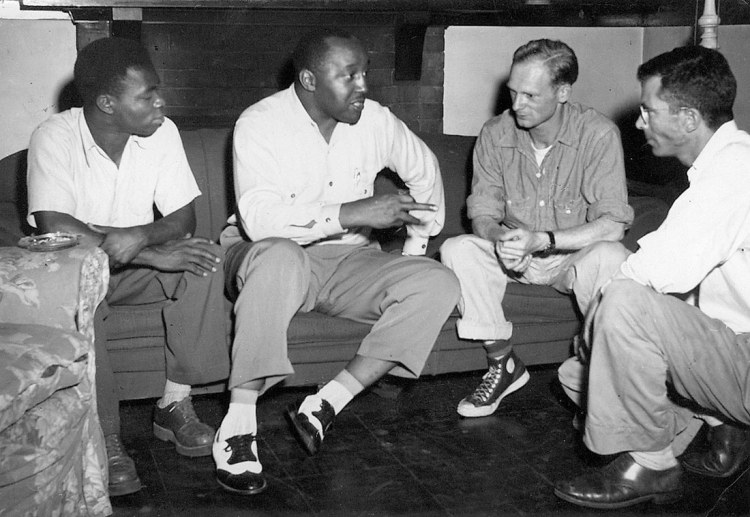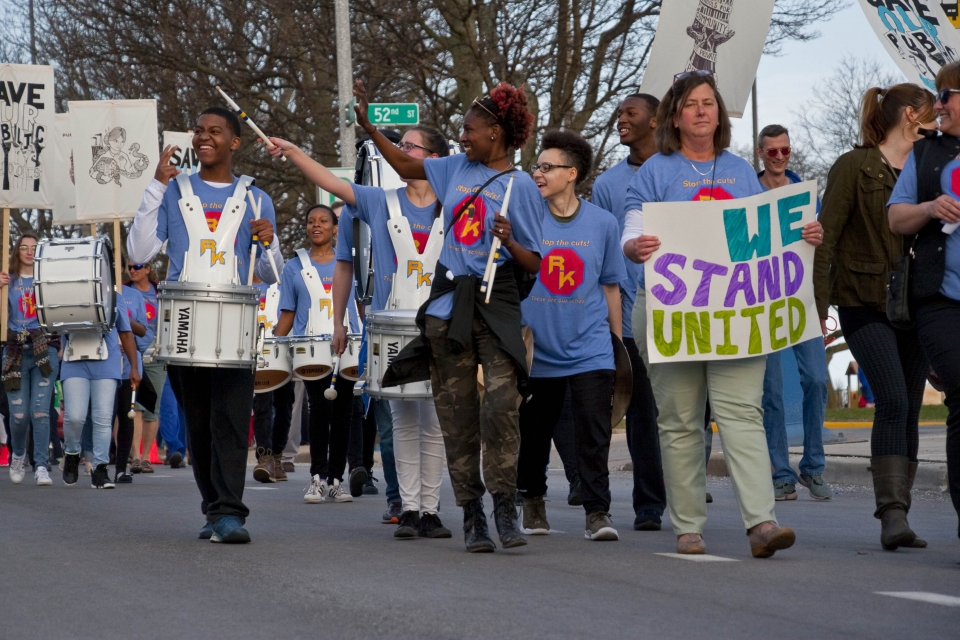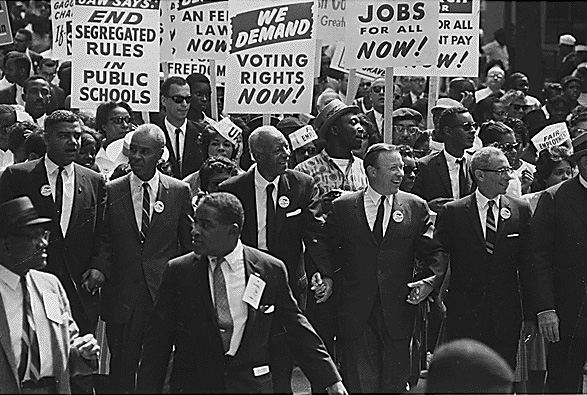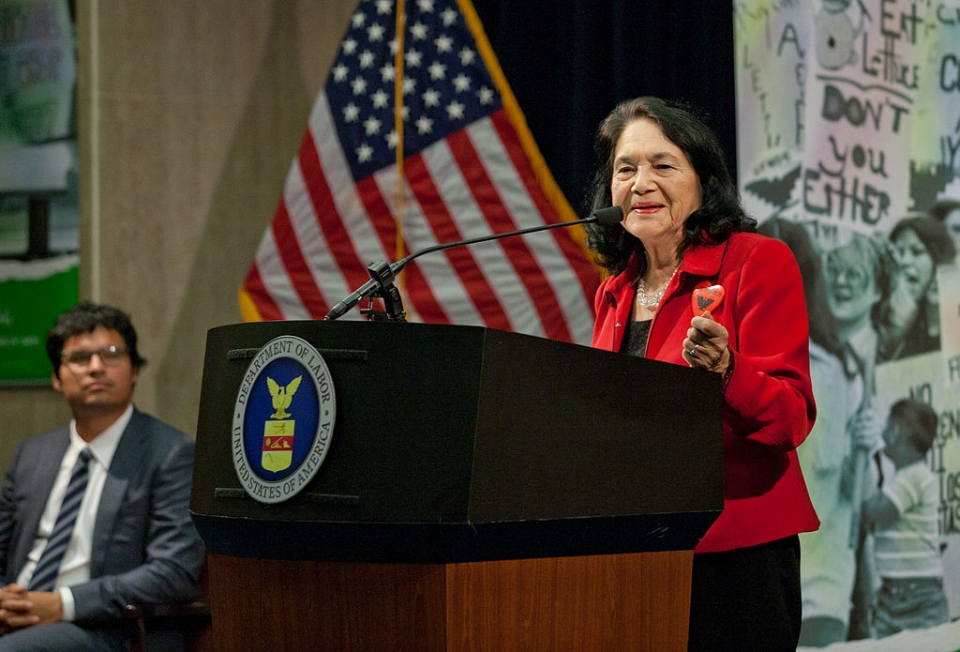
A 1952 photo of AFSC staff and interns discussing union organizing. Campbell Hays / AFSC
The labor movement has frequently been written off as dead in recent decades. I’ve never believed it, although there have been times when I felt like checking for a pulse.
Over the last few years, however, I’ve been thrilled to see a glorious revival, beginning with the 2018 strike by West Virginia teachers and school support workers, a statewide victorious and nonviolent uprising that:
- brought substantial pay increases to as many as 78,000 teachers, school support workers, and public employees;
- resulted in at least temporary improvements in coverage by Public Employees Insurance Agency;
- killed several bad potential pieces of legislation;
- showed the world what’s best in West Virginia; and
- set an inspiring example for teachers and workers around the country, which helped spark a nationwide wave of mostly successful strikes.
Both AFSC programs in West Virginia (the Appalachian Center for Equality and the WV Economic Justice Project) played supportive roles in the movement, as well as ongoing struggles to oppose efforts to privatize public education.
"My favorite image from that period was a photo of a Kentucky teacher holding a sign that said, “Don’t make us go West Virginia on you.”
To celebrate this Labor Day, here are some quotes to ponder from diverse voices about a movement that has frequently been the subject of premature obituaries:

“Labor is prior to, and independent of, capital. Capital is only the fruit of labor, and could never have existed if labor had not first existed. Labor is the superior of capital, and deserves much the higher consideration.” —Abraham Lincoln
“The American people have this to learn: that where justice is denied, where poverty is enforced, where ignorance prevails, and where any one class is made to feel that society is an organized conspiracy to oppress, rob, and degrade them, neither person nor property is safe.” —Frederick Douglass
"Ten thousand times has the labor movement stumbled and fallen and bruised itself, and risen again; been seized by the throat and choked and clubbed into insensibility; enjoined by courts, assaulted by thugs, charged by the militia, shot down by regulars, traduced by the press, frowned upon by public opinion, deceived by politicians, threatened by priests, repudiated by renegades, preyed upon by grafters, infested by spies, deserted by cowards, betrayed by traitors, bled by leeches, and sold out by leaders, but notwithstanding all this, and all these, it is today the most vital and potential power this planet has ever known, and its historic mission of emancipating the workers of the world from the thralldom of the ages is as certain of ultimate realization as is the setting of the sun.” —Eugene Victor Debs, labor leader and socialist
“When the union’s inspiration through the workers’ blood shall run/there can be no greater power anywhere beneath the sun/yet what force on earth is weaker than the feeble strength of one/but the union makes us strong,” —Ralph Chaplin, Industrial Workers of the World organizer and author of “Solidarity Forever,” the international anthem of the labor movement, which was inspired by a 1912-13 West Virginia coal miners’ strike
“What does labor want? We want more schoolhouses and less jails; more books and less arsenals; more learning and less vice; more leisure and less greed; more justice and less revenge; in fact, more of the opportunities to cultivate our better natures.” —Samuel Gompers, founder of the American Federation of Labor

“’The first thing is to raise hell,’ says I. ‘That’s always the first thing to do when you’re faced with an injustice and you feel powerless. That’s what I do in my fight for the working class.’” —Mary Harris “Mother” Jones, an Irish-born American labor organizer and hell raiser
“Justice is never given; it is exacted, and the struggle must be continuous for freedom is never a final fact, but a continuing evolving process to higher and higher levels of human, social, economic, political and religious relationship.” —A. Philip Randolph, African-American socialist and leader of the Brotherhood of Sleeping Car Porters union
“The labor movement was the principal force that transformed misery and despair into hope and progress.” —Martin Luther King Jr.
“What we would like to do is change the world ... by crying unceasingly for the rights of the workers, of the poor, of the destitute. We can throw our pebble in the pond and be confident that it’s ever widening circle will reach around the world.” —Dorothy Day, cofounder of the Catholic Worker movement
From the depth of need and despair, people can work together, can organize themselves to solve their own problems and fill their own needs with dignity and strength.” —Cesar Chavez, leader of the United Farm Workers union

“The freedom of association means that people can come together in organization to fight for solutions to the problems they confront in their communities. The great social justice changes in our country have happened when people came together, organized, and took direct action. It is this right that sustains and nurtures our democracy today. The civil rights movement, the labor movement, the women’s movement, and the equality movement for our LGBT brothers and sisters are all manifestations of these rights.” —Dolores Huerta, leader of the United Farm Workers union
“Yes, I think it’s really important to acknowledge that Dr. King, precisely at the moment of his assassination, was re-conceptualizing the civil rights movement and moving toward a sort of coalitional relationship with the trade union movement.” —Angela Davis, African-American scholar and freedom fighter
I’ll give the last word to West Virginia native Walter Reuther, leader of the United Auto Workers union:
"The labor movement is about changing society. What good is a dollar an hour more in wages if your neighborhood is burning down? What good is another week's vacation if the lake you used to go to is polluted and you can't swim in it and your kids can't play in it? And what good is another hundred-dollar pension if the world goes up in atomic smoke in a war?"
Happy Labor Day!